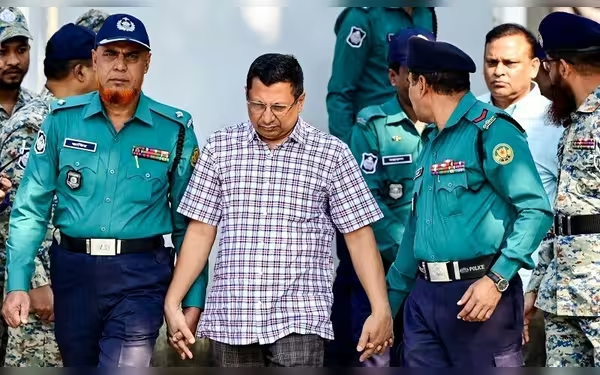Thursday, November 21, 2024 06:20 AM
Bangladesh Ex-Police Chief Charged With Crimes Against Humanity
- Former police chief faces serious humanity charges.
- Court proceedings reveal shocking allegations of brutality.
- Arrest warrant issued for Sheikh Hasina amid unrest.
 Image Credits: dawn
Image Credits: dawnFormer police chief Chowdhury Abdullah Al-Mamun faces charges of crimes against humanity in Bangladesh, raising questions about political accountability.
In a significant development in Bangladesh, the former police chief, Chowdhury Abdullah Al-Mamun, has appeared in court facing serious charges related to crimes against humanity. This case stems from a violent crackdown during the August revolution, which ultimately led to the downfall of Sheikh Hasina's regime. The allegations against Al-Mamun include overseeing brutal actions that resulted in numerous deaths and widespread human rights violations.
During the court proceedings, Al-Mamun was accompanied by current police officers, highlighting the gravity of the situation. Prosecutors have accused him of being responsible for horrific acts, including massacres and genocide. Chief prosecutor Mohammad Tajul Islam emphasized the severity of the crimes, stating that they were “that even devils dare not do.” This statement underscores the shocking nature of the allegations and the impact of the actions taken during the unrest.
Alongside Al-Mamun, seven other defendants, including Ziaul Ahsan, a former commander of the Rapid Action Battalion, faced similar charges. The prosecution presented a detailed account of the alleged crimes, which included extrajudicial killings and the dismembering of bodies. Ahsan was also accused of shutting down the internet during the protests, a tactic often used to suppress dissent and control information.
As the court session unfolded, the atmosphere was tense. The defendants listened quietly to the charges against them, with one individual, Majharul Islam, breaking down in tears and pleading for mercy. His emotional outburst, “I supported the protests, please save me,” reflects the fear and desperation felt by those involved in this case.
The court has set a deadline for prosecutors to complete their investigation report by December 19, while the accused remain in custody. This case is part of a broader pattern of human rights abuses that occurred during Hasina's 15-year rule, which has been marked by the mass detention and extrajudicial killings of political opponents.
In a surprising twist, the court has also issued an arrest warrant for Sheikh Hasina herself, accusing her of involvement in “massacres, killings, and crimes against humanity.” Following the collapse of her government, Hasina fled to India, where she currently remains in exile. This situation raises important questions about accountability and justice in Bangladesh, as the nation grapples with its tumultuous political history.
As this case unfolds, it serves as a reminder of the importance of upholding human rights and the rule of law. The actions taken by those in power can have devastating consequences for ordinary citizens, and it is crucial that justice is served. The world will be watching closely as the legal proceedings continue, hoping for a resolution that honors the victims and holds the perpetrators accountable.













